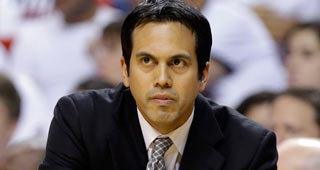The unforeseeable silver lining that randomly occurs whenever a good team loses a vital player is what makes NBA basketball so compelling. From the Los Angeles Clippers sustaining their juggernaut offense after Blake Griffin broke his hand, to the Memphis Grizzlies abandoning their Grit N’ Grind way of life—without falling apart—when Marc Gasol broke his foot.
Major injuries force organizations to adapt on the fly. Sink or swim. It’s fascinating to watch them adopt a different playing style, or find a new lineup they otherwise had no need to explore, and have success.
This is now happening to the Miami Heat. With Chris Bosh out indefinitely, Miami has quietly morphed from a sloth into a gazelle. They averaged 94.67 possessions per 48 minutes before the All-Star break, which ranked 29th out of 30 teams. Since, they’re up to 98.35, which ranks 16th.
In Bosh’s place is the 6’8” Luol Deng, effectively turning the Heat into a full-time small-ball operation. They outscore opponents by 7.4 points per 100 possessions when he’s on the court, and just about break even when he sits.
“It’s a requirement for us,” Erik Spoelstra said after a loss against the Los Angeles Lakers. “That’s the benefit of it. Chris Bosh goes out, you have to do things differently.”
Behind an offense that obliterates everything in its path, Miami’s new starting lineup (Goran Dragic, Dwyane Wade, Joe Johnson, Deng and Amar’e Stoudemire) is outscoring opponents by 14.5 points per 100 possessions over their last 21 games. The team still doesn’t shoot threes, but they’re controlling games by dominating the paint, rebounding and scoring inside. And their stylistic alterations are catching opposing teams off guard.
Over the past few weeks, Deng has noticed a look of confusion on players who don’t know whether to guard him as a three or four. “We’re getting a lot of mismatches,” he said. “Sometimes they switch and our guards get an advantage, or I go to the post and we make plays out of it.”
The benefit of having so many like-sized players on the floor at the same time extends to their defense, too. Speed and athleticism is a plus—particularly when Miami unleashes its rookies Justise Winslow and Josh Richardson off the bench—but so is versatility. The Heat has multiple lineup combinations featuring multiple players who can guard multiple positions. They’re quick, long, active and rangy, and do a tremendous job guarding the three-point line and securing the paint.
“I don’t mind a fast pace. I like it. It don’t bother me at all,” Heat center Hassan Whiteside said. “I still have to go out there and try to do my job, try to get every rebound, try to make the best plays when I do have the ball and block as many shots as I can.”
Whiteside might be Miami’s most impressive all-around player from opening night until today. He alters shots at the rim, has the third highest true shooting percentage in the league and is virtually guaranteed to sign a max contract this summer.
He’s important, but the Heat’s barometer might instead be the speedy Dragic, who’s never looked more comfortable since the team acquired him at last year’s trade deadline. The 29-year-old is averaging 17.2 points, 7.4 assists and 4.5 rebounds per game since All-Star Weekend. His three-point shot has all but disappeared, but that’s forgivable when you’re getting to the basket at will.
Since Deng became Miami’s full-time starting power forward, Dragic’s averaging more drives per game than LeBron James, James Harden and Russell Westbrook. He’s been relentless.
“He’s a fastbreak kind of guy,” Deng said about his point guard. “That’s what he’s comfortable with, and I think with our team it took us a while to really get to know our personnel. I think a lot of times, going into a screen and slipping gives him that angle to drive, instead of setting it all the time.”
The fountainhead to some of Miami’s championship success over the past half decade has been their ability to refashion on the fly. We’ve seen this before: When an abdominal strain sidelined Bosh in the 2012 playoffs, and forced Spoelstra to play LeBron James at power forward.
The stakes aren’t nearly as high right now, and the ceiling is noticeably lower than it was when Miami employed the world’s best player. Time will tell if their new look will be as useful in the playoffs as it’s been over the past few weeks, but all the positive side effects of starting Deng at power forward have saved the Heat’s season. Until then, that’s what matters.



